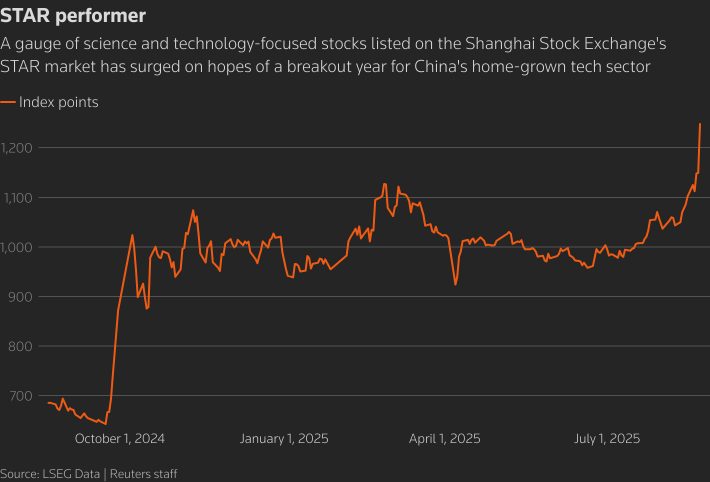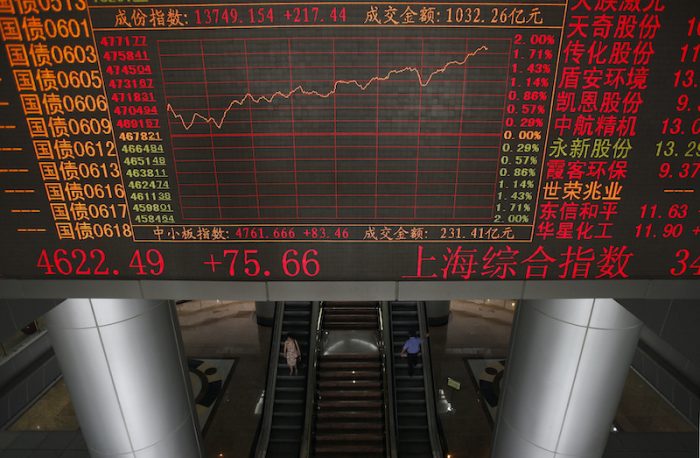Chinese stocks shot up to a 10-year-high on Friday, with the Shanghai benchmark surging above the 3,800 mark on renewed optimism over domestic artificial intelligence prospects.
The Shanghai Composite Index was 1.5% up when it closed at 3,825.76, the highest level since August 2015. That created a weekly gain of 3.5% – its best run since November 2024.
The blue-chip CSI300 Index rose 2.1% to a new 10-month high, and ended the week with 4.2% gain, while the tech-focused Star50 index was up 8.6%. The rise has domestic roots and contrasts with a decline in AI-related stocks in the US amid talk about an AI ‘bubble’ and a report noting that many businesses are getting little commercial benefit from AI investments.
ALSO SEE: China’s Boom and Bust Real Estate Giant Won’t be Missed
“Both individual and institutional investors are accelerating the asset reallocation and shifting money away from bonds to stocks,” Cheng Yu, a portfolio manager at the China fund unit of Allianz Global Investors, said.
“There’s growing consensus that we’re seeing a bull market in the making.”
Domestic AI-related shares led the rise onshore on Friday, with the CSI Semiconductor Industry Index up 9.5% after surging as much as 10% and the CSI Artificial Intelligence Index up 6.6%.
Chipmaker Cambricon Technology and Hygon Information Technology both climbed by the 20% daily limit to record highs. Industry giant SMIC jumped over 14%.
The tech rally gained momentum after Reuters reported that Nvidia has asked Foxconn to suspend work on the H20 chip, the most advanced model the US company is currently allowed to sell in China.
That came after DeepSeek released an upgrade to its flagship V3 AI model on Thursday with domestic semiconductors supports, underscoring Beijing’s push toward chip self-sufficiency.

Shanghai benchmark up 23% since April
The renewed tech optimism could further fuel China’s rally, with the Shanghai benchmark now up 23% from its April low, as domestic investors rotate funds into stocks amid easing US-China tensions and Beijing’s push against industrial overcapacity.
A-share turnover on the Shanghai and Shenzhen exchanges has exceeded 2 trillion yuan for eight consecutive days, the longest such streak on record.
“For now, FOMO (fear of missing out) sentiment still dominates, leading to buy-the-dip flow on every market correction,” Goldman Sachs analysts said.
Generally, onshore investors believe that downside risk is low in the near-term, and that the market may have room to rally further, they added.
Hong Kong’s benchmark Hang Seng Index closed up 0.9%, recouping earlier losses in the week to register a third consecutive weekly gain.
Tech shares also led gains in the city, with the sub-index up 2.7% and AI sector up 2.6%.
‘A tricky divergence from a slowing economy’
However, there were words of caution from Nomura analysts led by Ting Lu, who said they believed China’s stock market rally since September last year had been primarily driven by solid fundamentals.
The Wind All A-Share Index, which covers all A-shares, had surged 56% in that time, they noted, while the offshore Hang Seng Index had risen by 40%.
But, based on what has happened previously, “the boom has the potential to lead to a rise in irrational exuberance, an increase in leveraging, and a formation of bubbles,” they said.
Economic fundamentals might weaken visibly in the second half on various fronts, “and the stock market rally in itself may not provide much of a boost to the real economy.
“In our view, Beijing may need to tread carefully in the next couple of months over handling the tricky divergence between the slowing economy and rising stock market euphoria.”
- Reuters with additional editing by Jim Pollard
























